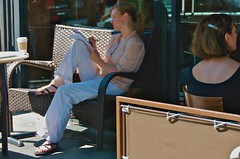 Image by Ed Yourdon via Flickr
Image by Ed Yourdon via Flickr
This summer, spend a little time writing a short story. Be creative. Use your imagination. Don't worry about spelling or punctuation. Just write a story. Tell a tale.
Once you're done, read your story out loud to yourself. Does it sound right? Have you chosen the right words? Correct anything that you think needs to be changed. Re-word anything that seems awkward.
After the story sounds right, spend some time checking spelling and punctuation.
The last step is to have someone else read your story. Ask for their honest opinion. If they give you suggestions or corrections that will make your story better, make those changes.
At this point your story should be done, but it always helps to put it away for a week or so, then read it again. Sometimes, after a little time, you'll see other things that need to be changed.
So why do all this? The creative process of writing can carry over to other parts of life. Creativity is key in music, poetry, art, architecture, and mathematical and scientific discoveries. Writing also increases vocabulary and can improve your spelling, grammar, and punctuation skills.
If you think your story is good enough, you may be able to submit it to a magazine for publication or at least use it as an assignment for one of your classes next school year.







![Reblog this post [with Zemanta]](http://img.zemanta.com/reblog_e.png?x-id=4aa2375d-6fe2-4f69-929f-3de97764a357)